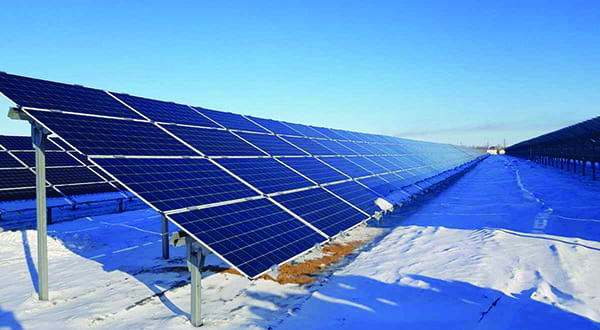Kazakhstan Adds New Solar Plant to Growing Renewables Capacity
Credit to Author: POWER| Date: Fri, 01 Mar 2019 00:00:00 +0000
The SES Saran solar power plant entered commercial operation in late January in Saran, in the Karaganda region of Kazakhstan, an area long known for its coal production. Government officials said the plant is part of the country’s “go green” movement, with a commitment to renewable energy as outlined by President Nursultan Nazarbayev, who has served as Kazakhstan’s president since the office was created in 1990, when the country broke away from the Soviet Union.
 |
1. The Saran solar power plant came online in January in Kazakhstan. It sits on 405 acres and was built with more than 307,000 solar panels from Canadian Solar. Kazakhstan’s government is pushing renewable energy projects in an effort to move the country away from coal-fired power generation. Courtesy: Karaganda-Region.gov.kz |
The 100-MW Saran facility (Figure 1), sited on 405 acres and using 307,664 solar panels from Canadian Solar, is considered the largest solar plant in Central Asia to date. Kazakh Energy Minister Kanat Bozumbayev said at a ceremony announcing the plant that the government wants to increase what he called “alternative” energy—or non-fossil-fueled generation—to 3% of the country’s total generation portfolio by 2020, to 10% by 2030, and to 50% by 2050. “Sixty renewable energy installations with a total capacity of 531 MW have been built and are operating in Kazakhstan,” Bozumbayev said at the launch of the Saran plant. He said another 50 renewable energy installations with total generation capacity of 2,353 MW are expected to come online over the next year.
Solarnet Investment GmbH, an affiliate of German developer Goldbeck Solar, built the Saran plant, supported by financing from the European Bank for Reconstruction and Development (EBRD)-GCF Kazakhstan Renewables Framework. The EBRD reportedly provided $73.4 million for the project in November 2018. The Green Climate Fund, part of the United Nations Framework Convention on Climate Change, also reportedly contributed $22 million to the project. The total project cost was estimated at more than $130 million, which includes a dedicated substation for the plant near Saran. Goldbeck officials, at a recent event in Berlin, Germany, said the solar plant will sell power to a state-run power generator under a 15-year power purchase agreement at a price of 34.61 KZT ($0.091) per kWh indexed with inflation.
There are several more solar farms under development in Kazakhstan, including another 100-MW plant planned by KB Enterprises and backed by ABB near Kabanbay, in the Tselinograd district. The EBRD also is involved in financing that plant, and has said it is committed to providing about $230 million for renewable energy projects in Kazakhstan. Other planned projects in the country include a 14-MW solar project planned by Urbasolar of France; the 50-MW Baikonur Solar park, being built in the Kyzylorda region; two more 50-MW solar plants, Burnoye Solar 1 and 2, in the Zhambyl region; and a 28-MW solar plant being developed by Nomad Solar, a Kazakhstan company co-owned by Total Eren SA of France and Access Infra Central Asia Ltd. of the United Arab Emirates.
Another four solar projects, with a total 170 MW of generation capacity, were tendered in October by Kazakhstan’s JSC KOREM. That tender was the first in a planned series of auctions for renewable power planned by the country’s government, with a goal of assigning 1 GW of renewable generation capacity. Kazakhstan’s move toward renewable energy comes as the country’s government faces calls to reduce its dependence on coal-fired generation, which supplies at least 75% of Kazakhstan’s power. Residents in Temirtau, about 40 kilometers north of Saran, were alarmed last year when black snow fell in the city. Kazakhstan officials have said the country has about 37.5 billion tons of coal yet to be mined. The country is energy-rich—it is the world’s leading producer of uranium, and has large reserves of oil and gas. It also has great solar power potential; the government said the sun shines on about 70% of days on an annual basis.
—Darrell Proctor is a POWER associate editor (@DarrellProctor1, @POWERmagazine).
The post Kazakhstan Adds New Solar Plant to Growing Renewables Capacity appeared first on POWER Magazine.